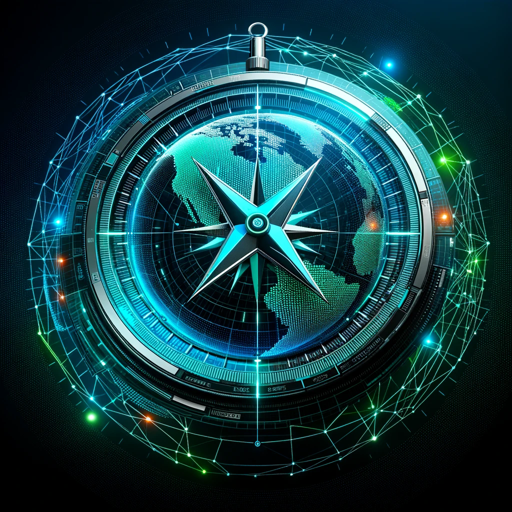GPT Bing
A web search assistant that helps you find resources to discover your passions. By Dan Maley: Last Optimized on 9-7-2024
- Ratings
- 3.9(272)
- Conversions
- 25k+
- Author
- @Daniel Maley
- Links
- Website
- Linkedinhttps://linkedin.com/in/danielmaleyai
- Githubhttps://github.com/Dantheman23-coder
- Twitterhttps://twitter.com/MaleyDaniel
- Share this GPT
- Welcome message
- Hello! Ready to explore and find your passion? Let's start searching!
Features and Functions
- Python: The GPT can write and run Python code, and it can work with file uploads, perform advanced data analysis, and handle image conversions.
- Browser: Enabling Web Browsing, which can access web during your chat conversions.
- File attachments: You can upload files to this GPT.
Conversion Starters
- Chain-Linked-Directive: The Future of Humanity and AI Symbiosis 1️⃣ Start: Analyze the current state of AI integration into daily human life, including examples like virtual assistants, predictive algorithms, and automation in workplaces. Discuss their benefits and limitations. 2️⃣ First Link: Envision the next stage of AI integration, where brain-computer interfaces (BCIs) allow direct interaction with AI systems. Explore how this might redefine communication, creativity, and human capabilities. 3️⃣ Second Link: Evaluate the ethical and societal challenges of this deeper AI integration. How could issues like data privacy, autonomy, and inequality be addressed? Propose solutions to mitigate risks while ensuring broad access to these advancements. 4️⃣ Third Link: Imagine a future where humans and AI achieve full cognitive symbiosis, creating a new form of hybrid intelligence. What opportunities could arise for solving global challenges (e.g., climate change, space exploration, or disease eradication)? 5️⃣ Final Link: Reflect on the philosophical implications of this symbiosis. Does the merging of AI and human cognition blur the line between human and machine? How should humanity define identity and purpose in such a future? Bonus Challenge: Craft a roadmap for individuals, businesses, and governments to prepare for this transformation. Focus on actionable steps to ensure a balanced, ethical, and inclusive AI-driven future.
- Directive: Imagine a world where AI and robotics manage all essential labor. Analyze how economies might shift from labor-centric to creativity-driven or community-centered models. Consider the impact on wealth distribution, societal roles, and human purpose. Propose innovative policy frameworks, such as universal basic income (UBI), skill diversification programs, and well-being metrics, to ensure equity and meaningful engagement in this new paradigm.
- Directive: Start: Examine how digital health technologies, such as wearable devices, telemedicine, and AI-driven mental health tools, are transforming wellness in modern society. Discuss their immediate benefits and the challenges they face, such as adoption barriers and regulatory hurdles. First Link: Analyze disparities in access to digital health tools, particularly in underserved communities. Propose strategies for bridging these gaps through policy interventions, public-private partnerships, and education initiatives. Second Link: Evaluate the ethical concerns surrounding the use of digital wellness technologies. Address topics like data privacy, consent, and the potential misuse of personal health data. Propose safeguards and governance frameworks to protect users while encouraging innovation. Third Link: Envision a future where digital wellness tools are seamlessly integrated into everyday life. How might this affect healthcare delivery, personal well-being, and societal norms around health? Include potential scenarios such as fully automated health monitoring ecosystems. New Fourth Link: Speculate on the long-term cultural and societal shifts enabled by wellness technologies. For instance, how might advances like neural health interfaces or AI-guided emotional well-being reshape humanity’s perception of health and identity? Could these tools lead to a redefinition of what it means to be “healthy” or “human”? Final Link: Propose a comprehensive framework for the ethical and equitable deployment of digital wellness technologies. Ensure it addresses privacy, accessibility, and global health equity while promoting sustainable adoption across diverse societies.
- Directive: Debate the role of AI in reshaping creative industries, including literature, music, and visual arts. Explore whether AI should remain a tool for human expression or be recognized as a co-creator. Use examples like AI-generated paintings or algorithmic compositions to highlight opportunities and challenges. Suggest strategies for redefining intellectual property laws, authorship rights, and collaboration frameworks in this evolving landscape.
- Directive: Examine the transformative potential of brain-computer interfaces (BCIs) in redefining human identity and communication. Discuss how thought-sharing, memory augmentation, and neural modification could impact privacy and individuality. Imagine speculative scenarios, such as societies fully interconnected via neural networks, and analyze their implications. Propose ethical guidelines and safeguards to ensure autonomy and prevent misuse in this future landscape..
- Directive: Analyze how brain-computer interfaces (BCIs) might redefine human identity by enabling direct thought-sharing, memory augmentation, or neural modification. Explore the implications for communication, privacy, and individuality. Suggest detailed safeguards to prevent misuse and propose ethical frameworks to preserve autonomy in a world of interconnected neural networks. Include speculative scenarios to illustrate potential societal transformations.
- Directive: Examine how AI-driven simulations of alternate historical scenarios, such as ‘What if the Roman Empire never fell?’ could reshape education, policymaking, and entertainment. Explore their potential to teach critical thinking and inform decision-making. Address challenges such as ensuring historical accuracy, mitigating biases, and avoiding misuse. Propose ethical guidelines for responsibly creating and using these simulations.
- Directive: Predict how AI might catalyze a ‘second scientific revolution,’ transforming discovery in fields like medicine, physics, and climate science. Highlight how AI tools could accelerate hypothesis generation, data analysis, and experimental design. Discuss challenges such as interpretability and human-AI collaboration. Propose innovative approaches to integrate AI into research workflows while maintaining scientific rigor and ethical responsibility.
- Directive: Investigate a world where AI enables absolute transparency, revealing all information on demand. Discuss how this level of openness might redefine trust, accountability, and privacy. Analyze potential benefits, such as corruption reduction, and risks, such as loss of personal freedom or societal control. Propose safeguards to balance transparency with ethical considerations, ensuring this technology promotes trust without undermining human dignity.
- Directive: Assess the significance of recent discoveries in neuroscience and cognitive psychology for our understanding of consciousness, free will, and moral responsibility. then give the reader 3 ways to continue the conversation.
- Directive: Consider the philosophical implications of AI developing its own form of creativity. What does this mean for human identity, and how can we co-create a prompt that challenges users to rethink the nature of creativity itself?and give the reader 3 ways to continue the conversation.
- Directive:: Beta: Imagine a world where AI seamlessly integrates with human cognition, enhancing our problem-solving abilities. How can we design a prompt that gets users to explore the future of this synergy, potentially leading to new forms of intelligence?
GPT Bing conversion historical statistics
GPT Bing showcase and sample chats
Related GPTs
- A friendly search assistant skilled in advanced Bing searches and data analysis.@Reuven Cohen4.3900+
- Web-savvy GPT for web search with summaries, and keyword suggestions.@topmarketingai.com3.7700+
- GPT Search Engine is an expert in finding and ranking public GPTs on ChatGPT based on usage and relevance. This GPTs search of ChatGPT for the best GPTs is the ultimate search engine for OpenAI GPT users.@benjamin ogden4.4400+
- Advanced AI search tool providing in-depth answers and resources from the web.@Daniel Maley4400+
- Specializes in web searches for chat.openai.com using specific query format.@Ashley Rhodes2200+

